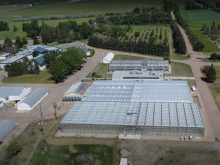SASKATOON – Saskatchewan Wheat Pool is buying a 13.25 percent interest in Can-Oat Milling of Portage la Prairie, Man., the largest processor and exporter of oats in Canada.
Sask Pool will also join Manitoba Pool Elevators as a long-term supplier of the plant.
“There is no way we can source the amount of oats we are going to need out of Saskatchewan by doing it with our grain buyers here,” said Karl Jerrand, Can-Oat vice-president of marketing.
“Saskatchewan Wheat Pool has a powerful grain network controlling the grain movement out of Saskatchewan and we see that as an important step for us to secure supply here amid intense competition,” he said from Portage la Prairie.
Read Also

Alberta crop diversification centres receive funding
$5.2 million of provincial funding pumped into crop diversity research centres
Bill Hunt, general manager of Sask Pool’s food and industrial group, said he expects the pool to supply Can-Oat with 30,000 tonnes of grain a year. The plant has a capacity of processing 125,000 tonnes of oats into 75,000 tonnes of end products.
The deal fits the Pool’s interest in expanding its presence in processing and the investment should provide an acceptable return, Hunt said.
Neither party would reveal the cost of the deal.
Since it was built in 1991, Can-Oat has built a brisk trade with American food companies, supplying them with oat bran, flour, groats and rolled oats.
“We’ve had tremendous growth over the last five years to the point that this facility in Portage is completely sold out,” Jerrand said.
“That puts us in a good position and we are looking at other opportunities to maximize our customer base and improve the company.”
Hunt said the investment will be used as working capital.
Expanding the plant “is a decision that would have to be made down the road and would be driven by what we think the market will be,” he said.
Trade with the U.S. is growing because oat production south of the border is shrinking due to unfriendly federal farm programs, competition from other crops and weather that is not as good for oat prodution as it is in Canada, Jerrand said.
Several American companies contract directly with Canadian farmers or go through Canadian grain companies to get supply.
The interest helped push the area seeded to oats in Canada to almost five million acres, an increase of 27 percent from last year and 53 percent more than the 1980s average.
“If farmers know the oats they are selling will go to a value-added company (in Canada) it will give Sask Pool a tremendous advantage, Jerrand said.
“Farmers respect the importance of adding value to their grain rather than shipping raw grain across the border.”














